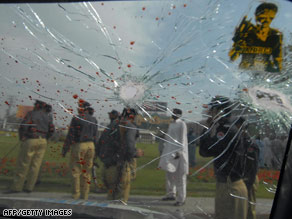
At least six security personnel were confirmed killed and six members of Sri Lanka’s cricket team hurt Tuesday after gunmen attacked the team’s bus in Lahore, Pakistan.
The Sri Lankan squad had been making its way to the city’s Gaddafi Stadium for the third day of the second test match against Pakistan at around 9 a.m. local time (11 p.m. ET) when the attack occurred. Police said at least 12 gunmen had opened fire on the bus. Pakistani Information Minister Sherry Rahman told CNN that the attackers were still at large. At least six players, one coach and up to 10 security staff were reported hurt in the attack. Batsmen Tharanga Paranavitana and Thilan Samaraweera suffered gunshot wounds, according to the Sri Lankan Ministry of Foreign Affairs. Four more players — team captain Kumar Sangakkara, Ajantha Mendis, Suranga Lakmal, Thilina Thushara — and assistant coach Paul Fabrece suffered minor injuries from glass shrapnel. Witnesses who saw the attack desctibed the scene as “pandemonium,” but praised the response of security officials. “I heard two loud explosions outside the stadium and a lot of AK-47 fire,” said Hamish Roberts, a camera operator who was inside the stadium when the attack occurred.Sports producer Gavin Scovell said security teams responded quickly. “The guards were brilliant. They weren’t panicking. They were very calm,” Scovell said. “It must have been a terrifying experience, but they handled it well.” Authorities in Lahore said that the team was safe. But security official Nadeem Sayed said that some of the players were in a serious condition. “This is a very well-planned attack. The team is very much scared,” he said. Pakistan, which is battling Islamist and Taliban insurgents in its North West Frontier Province, has struggled to attract visiting cricket teams in recent years because of security concerns. In 2002 a car bomb exploded outside a hotel where the New Zealand cricket team was staying. Last year Australia canceled a proposed tour in the wake of a series of suicide bombings and the International Cricket Council was forced to postpone the high-profile ICC Champions Trophy after five of the eight invited teams pulled out. Sri Lanka agreed in December to visit Pakistan after the Indian cricket team called off its tour following November’s terror attacks in Mumbai. Indian authorities blamed the attacks on Pakistan-based militants. In a statement, ICC Chief Executive Haroon Lorgat said the attack was “very upsetting for the wider cricket family.” “We note with dismay and regret the events of this morning in Lahore and we condemn this attack without reservation,” Lorgat said. “I have confirmed with both member boards that the remainder of the tour has been cancelled and we are working hard to get our match officials out of the area as safely and as quickly as possible.” Pakistan’s Cricket Board had hoped Sri Lanka’s tour would help it recoup some of more than $16 million it was set to lose as a result of India’s cancellation. “This has really damaged Pakistan,” former Pakistani cricket player Zahir Abbas told Geo-TV. “Already some teams didn’t want to come to Pakistan. Now who will come after this incident” A.M.J. Sadiq, spokesman for Sri Lanka’s foreign affairs ministry, called the attack “outrageous” and said Foreign Affairs Minister Rohitha Bogollagama was rushing to Pakistan. Sri Lanka was working with Pakistan to ensure the safe return of the Sri Lankan cricketers, according to Sadiq. The Sri Lankan offer to tour was a reciprocal gesture. Pakistan was one of two countries that agreed to tour Sri Lanka during the 1996 World Cup tournament, while other countries refused to travel there because of security concerns. Sri Lanka is in the midst of a bloody civil war pitting the government against Tamil separatists.
Don’t Miss
Gates calls Pakistan ‘most worrisome’
iReport.com: Send photos, video
The Pakistani government has struggled to control terrorism. The Taliban and other insurgents have carved havens in Pakistan’s North West Frontier Province. Former Prime Minister Benazir Bhutto, 54, was heading the opposition to then-President Pervez Musharraf when she was assassinated in December 2007 during a campaign rally in Rawalpindi ahead of parliamentary elections. The Pakistani government and CIA officials said Baitullah Mehsud, leader of the Taliban in Pakistan, was responsible for her death. India has long accused Pakistan of being a haven for extremists. New Delhi has blamed Pakistan-based terrorists for an attack on India’s parliament in 2002 and for the November attacks in Mumbai.
“We are shocked at the audacious attack on the Sri Lankan cricketers at Lahore this morning,” an Indian representative said. “We offer our sympathies and good wishes for their speedy recovery, as well as of those other individuals who have been caught up in the attack.” “Terrorism based in Pakistan is a grave threat to the entire world,” the statement said. “It is in Pakistan’s own interest to take prompt, meaningful and decisive steps to dismantle the terrorist infrastructure once and for all.”